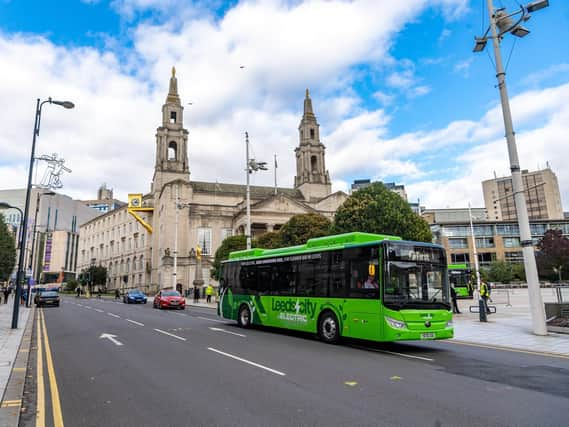Why we need a better public transport system and how it can be achieved


And it is sorely needed. As we emerge from lockdown, we are seeing a car-led recovery, with traffic levels almost back to pre-Covid levels while the use of buses and trains lags behind.
If this trend continues, it will lead to extra congestion, gridlock even, in our urban centres like Leeds, and a further withdrawal of bus services serving rural areas and edge of town estates. And that all means more carbon emissions, more air pollution and more social isolation.
Advertisement
Hide AdAdvertisement
Hide AdAnd let’s not forget that around 2,000 people a year die on our roads. It is illogical to argue for perfect safety in buses and trains while letting car travel let rip. And to allow people to be crammed in, sitting next to each other in narrow seats on planes.
Electric cars are often seen as the holy grail. They are not, unless you are prepared to see a big increase in congestion on our roads, and unless you are content to write off the quarter of the population that has no access to a car. Less levelling up, more locking out.
The campaign has several key objectives. It wants to change the perception of public transport. Almost everybody on a bus or train feels perfectly safe, according to Transport Focus research, whereas around half of those who are not on board say they would not feel safe.
These are the same people who jostle and bump into each other in the supermarket without any apparent concern.
Advertisement
Hide AdAdvertisement
Hide AdSecond, the Cabinet Office review into social distancing must be published, with a recognition that an indefinite continuation of the two-metre rule is incompatible with a return to pre-Covid passenger numbers and incompatible with any sort of financial self-sufficiency for public transport.
Third, the Government must provide certainty about the continuation of safety net funding for bus and train services, as a bridge to a financially sustainable future.
Fourth, as lockdown hopefully ends completely in June, the Government should coincide this with financial incentives to people to get back on buses and trains. Last year, we had an “eat out to help out” scheme to help cafes and restaurants. A similar scheme providing discounted travel for a period of perhaps a month should be introduced.
Fifth, and linked to above, we need the early introduction of the welcome pledges in the National Bus Strategy relating to universal contactless payment, and to integrated ticketing.
Advertisement
Hide AdAdvertisement
Hide AdOn rail, we need to see without any further delay the introduction of new ticket types that actually reflect when and how people want to travel. The weekly and monthly season, already on its way out before Covid, is to all intents and purposes over.
Sixth, the Government needs to set out a vision for the future and show how increased use of public transport is essential to a sustainable future, and in particular essential if we are to tackle carbon emissions from the transport sector and achieve the ambitious and stretching target for a 78 per cent reduction in carbon emission levels by 2035.
Paul Tuohy, Campaign for Better Transport’s chief executive says: “We are at a fork in the road as the country emerges from Covid. One arm of the fork leads to car dependency, increasing air pollution and carbon, more congestion and more isolation for those without access to a private car.
“The other offers the opposite: less carbon, cleaner air, lowered congestion and more social inclusion. Frankly, it’s a no-brainer.
Advertisement
Hide AdAdvertisement
Hide Ad"Yet while the Government seems to understand the arguments and seems well intentioned, we are not convinced they will actually follow through their own logic. Our campaign is designed to ensure they do.”
Norman Baker is the group’s policy adviser and a a former Lib Dem transport minister
For more info go to the-way-forward.org